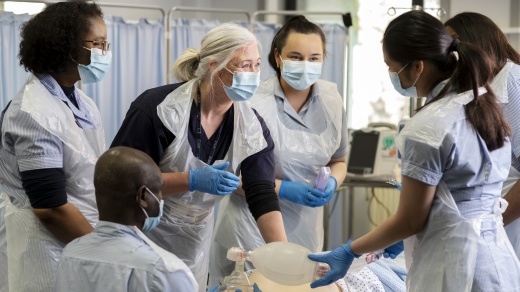Related
Stay up to date with our work
Our monthly updates are a great way for you to stay up to date with our work, events, and higher education news.
Last updated on Monday 30 Oct 2023 at 3:33pm

The Government’s ambitious plans to strengthen the NHS can only be achieved if significant changes are made to healthcare education and training now, warns Universities UK (UUK).
The NHS Long Term Workforce Plan (LTWP) was published by the UK Government in June this year, with the aim of addressing NHS staffing shortages across three key pillars: train, retain and reform. With opposition parties also signalling a commitment to invest in healthcare professionals over the coming years, now is a pivotal moment to secure the future of the NHS in England. Concern about the NHS is now the public’s second biggest worry according to recent Ipsos research, while research also shows people’s top priorities for the health service are expanding and supporting the NHS workforce.

The plan’s success however, hinges on a joint endeavour between education and healthcare providers, with universities both educating the next generation of healthcare professionals, and driving innovation that can improve health outcomes.
UUK says a number of challenges still need to be overcome if the LTWP is to meet its objectives and prevent the talent pipeline from drying up. This includes a need for higher education to expand health education capacity, and for a culture shift to take place within the NHS to place more value on students and educators.
UUK is setting out a five-point plan to meet the objectives of the LTWP:
With applications to nursing, midwifery and allied health professional (AHP) courses declining, UUK is calling on government for a major national recruitment campaign produced in partnership with universities, colleges, schools and the NHS.
Shortages in clinical academic and teaching staff is a limiting factor for expansion. Currently 50% of healthcare educators are over 50 years old. An urgent review is needed of educator roles and careers, to attract different kinds of staff into roles. A cultural shift is also needed within the NHS towards students and educators to make space for them and ensure they feel valued.
Expanding capacity to boost learner numbers will require extending university and college facilities as well as opening new schools. This means additional teaching space, flexible space and exam facilities. There are opportunities to extend capacity through learning technology such as immersive environments, simulation and robotics, all of which requires capital investment.
The availability, quality and distribution of placements must continue to be a focus for government, the NHS and universities and colleges. Closer working between the NHS in England and universities is required to diversify placement capacity in community settings such as care homes and schools, as well as increasing hospital placements.
Many health courses experience high rates of attrition that continue into early careers. Common factors include cost of living pressures and travel and accommodation expenses. Additional wellbeing and mental health support, more regular check-ins, better coaching and mentoring support is necessary. Financial support should be inflation linked and students from low-income families should receive more help.
Professor Alistair Fitt, Universities UK’s health policy lead, and Vice-Chancellor of Oxford Brookes University, said:
With political consensus on the need to significantly increase the number of healthcare professionals over the coming years, now is a pivotal moment to protect the future of the NHS in England.
To develop a well-staffed and efficient NHS, the UK Government must work closely with universities to fund the plan over the next 15 years, spanning general elections and spending reviews. We must take bold decisions to ensure the conditions are right for universities to train staff adequately, including on funding and capital investment, staffing and student recruitment.
For the government’s ambitions for our national health service to come to fruition requires a step change in healthcare education.
Professor Alistair Fitt
Universities UK’s health policy lead, and Vice-Chancellor of Oxford Brookes University
Higher education’s role in the delivery of the LTWP includes innovative approaches to education and training to identify future skills gaps, recruiting from more diverse communities, introducing new routes into the profession, new clinical roles and advances in technology.
Rachel Arthurs, a Midwifery student at the University of Surrey commented:
Being a healthcare student is not without its challenges, both physical and mental.
I am learning how to handle difficult situations that most people could never imagine facing in the workplace, however this is being made easier by my university’s state of the art simulation centre where we can practice both clinical and patient-facing skills. I cannot wait to join the workforce and continue to make a difference in the pregnancies and birth experiences of my patients
Rachel Arthurs
Midwifery student - University of Surrey
In March this year, there were at least 112,000 vacancies across the health workforce. The plan aims to ramp up training and double medical school places from 7,500 to 15,000 students, each year, by 2031. It also aims to increase nursing, midwifery and allied health training places to 72,400 by the same time.
Boosting the number of staff employed by the NHS in England from approximately 1.5 million in 2022 to around 2.4 million in 2036–37 is also a key ambition. By 2036-37, the objective is that almost half (49%) of public sector workers will work for the NHS, comprising one in 11 (9%) of all workers in England, compared with one in 17 (6%) in 2021–22.
To develop a well-staffed and efficient NHS, the UK Government must work closely with universities to fund the plan over the next 15 years, spanning both general elections and spending reviews.
Concerns around recruiting talent, retaining the workforce required and reforming the healthcare system in the UK have been highlighted in a new report commissioned by the Nuffield Trust:
Meanwhile, around one in five physiotherapists (21%), occupational therapists (21%), nurses (18%) and radiographers (17%) have left NHS hospital and community settings within two years of joining.
Universities UK has identified five systematic areas for change to ensure England’s healthcare talent pipeline doesn’t dry up:
Expanding or opening NHS clinical courses would have implications for staffing, student experience, support, accommodation, transport and infrastructure. These are decisions that make a longer-term commitment to health via partnerships with the NHS, local government, communities and other universities.
Similarly, expansion will require a cultural shift within the NHS and care sector, integrating workforce with financial management and service delivery, positioning education and learners at the centre and understanding their value in terms of patient outcomes and productivity.
The plan itself contains 200 asks across a fifteen-year horizon. It is essential that universities as key delivery partners are involved from the outset. Universities UK welcomes NHS England’s co-production of a roadmap.
The government has emphasised a commitment to a significant, long-term investment to transform the future of the NHS. It’s vital that funding is aligned with NHS England’s ‘implementation roadmap’ and allocated across all professional courses.
Healthcare faculties are subject to overlapping fields of health and education regulation. As part of their professional education, all health students must be prepared to meet the outcomes for graduates set by the relevant professional regulator.
Our monthly updates are a great way for you to stay up to date with our work, events, and higher education news.